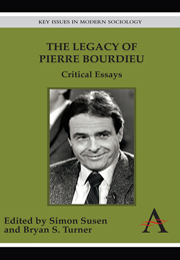Book contents
- Frontmatter
- Contents
- List of Contributors
- Introduction: Preliminary Reflections on the Legacy of Pierre Bourdieu
- 1 Between Structuralism and Theory of Practice: The Cultural Sociology of Pierre Bourdieu
- 2 Pierre Bourdieu: Unorthodox Marxist?
- 3 From Marx to Bourdieu: The Limits of the Structuralism of Practice
- 4 Durkheim and Bourdieu: The Common Plinth and its Cracks
- 5 With Weber Against Weber: In Conversation With Pierre Bourdieu
- 6 Bourdieu and Nietzsche: Taste as a Struggle
- 7 Elias and Bourdieu
- 8 Bourdieu and Adorno on the Transformation of Culture in Modern Society: Towards a Critical Theory of Cultural Production
- 9 The Grammar of an Ambivalence: On the Legacy of Pierre Bourdieu in the Critical Theory of Axel Honneth
- 10 Pierre Bourdieu and the Sociology of Religion
- 11 Bourdieu's Sociological Fiction: A Phenomenological Reading of Habitus
- 12 Overcoming Semiotic Structuralism: Language and Habitus in Bourdieu
- 13 Social Theory and Politics: Aron, Bourdieu and Passeron, and the Events of May 1968
- 14 Intellectual Critique and the Public Sphere: Between the Corporatism of the Universal and the Realpolitik of Reason
- 15 Practice as Temporalisation: Bourdieu and Economic Crisis
- Afterword: Concluding Reflections on the Legacy of Pierre Bourdieu
- Index of Names
- Index of Subjects
- Plate section
15 - Practice as Temporalisation: Bourdieu and Economic Crisis
Published online by Cambridge University Press: 05 March 2012
- Frontmatter
- Contents
- List of Contributors
- Introduction: Preliminary Reflections on the Legacy of Pierre Bourdieu
- 1 Between Structuralism and Theory of Practice: The Cultural Sociology of Pierre Bourdieu
- 2 Pierre Bourdieu: Unorthodox Marxist?
- 3 From Marx to Bourdieu: The Limits of the Structuralism of Practice
- 4 Durkheim and Bourdieu: The Common Plinth and its Cracks
- 5 With Weber Against Weber: In Conversation With Pierre Bourdieu
- 6 Bourdieu and Nietzsche: Taste as a Struggle
- 7 Elias and Bourdieu
- 8 Bourdieu and Adorno on the Transformation of Culture in Modern Society: Towards a Critical Theory of Cultural Production
- 9 The Grammar of an Ambivalence: On the Legacy of Pierre Bourdieu in the Critical Theory of Axel Honneth
- 10 Pierre Bourdieu and the Sociology of Religion
- 11 Bourdieu's Sociological Fiction: A Phenomenological Reading of Habitus
- 12 Overcoming Semiotic Structuralism: Language and Habitus in Bourdieu
- 13 Social Theory and Politics: Aron, Bourdieu and Passeron, and the Events of May 1968
- 14 Intellectual Critique and the Public Sphere: Between the Corporatism of the Universal and the Realpolitik of Reason
- 15 Practice as Temporalisation: Bourdieu and Economic Crisis
- Afterword: Concluding Reflections on the Legacy of Pierre Bourdieu
- Index of Names
- Index of Subjects
- Plate section
Summary
Introduction
This chapter will examine the question of whether Bourdieu's social theory can be mobilised to understand our recent and ongoing global economic crisis. This may seem an odd question to pose on many fronts, not least because – and with the exception of markets for normatively defined cultural goods – Bourdieu's corpus is rarely, if ever, called upon to engage with strictly economic processes and formations. And this is the case despite the fact that Bourdieu (2005 [2000]) dedicated a whole volume to the study of the social structures of the economy and despite the fact that in his later, arguably more polemical, work (Bourdieu, 1998; 1999 [1993]; 2003 [2001]) he directly engaged with the political economy of neo-liberalism, mounting a sustained critique of what he termed the ‘tyranny of the neo-liberal market’.
Yet, while this is so, Bourdieu's social theory is widely critiqued for its lack of traction in regard to economic processes, not least because of its inability to grasp the specificity of capitalist economic relations. Craig Calhoun (1993), for example, has argued that despite the emphasis we find in Bourdieu on the forms of capital (Bourdieu, 1986), what is striking is that nowhere in Bourdieu's social theory do we find an elaboration of the specificity of capitalist capital. Thus, while Bourdieu understands the various capitals he describes as comprising accumulated labour, he fails to specify what differentiates capitalist capital from such labour.
- Type
- Chapter
- Information
- The Legacy of Pierre BourdieuCritical Essays, pp. 347 - 366Publisher: Anthem PressPrint publication year: 2011
- 27
- Cited by



